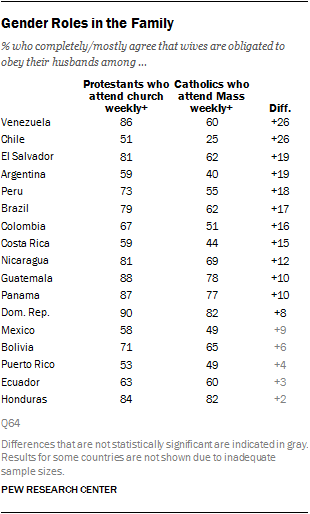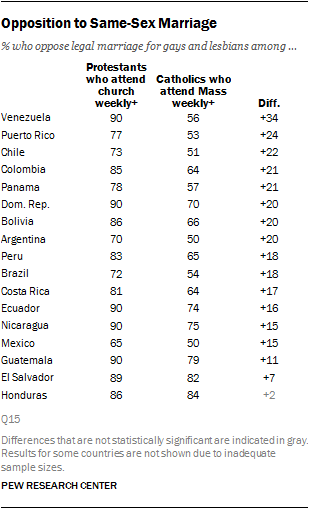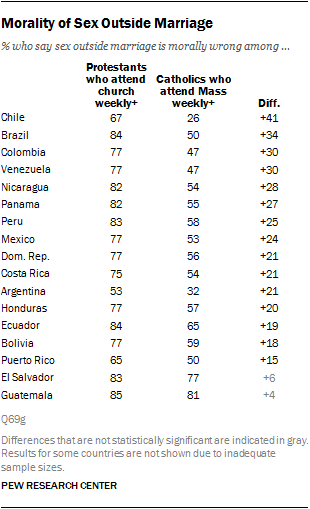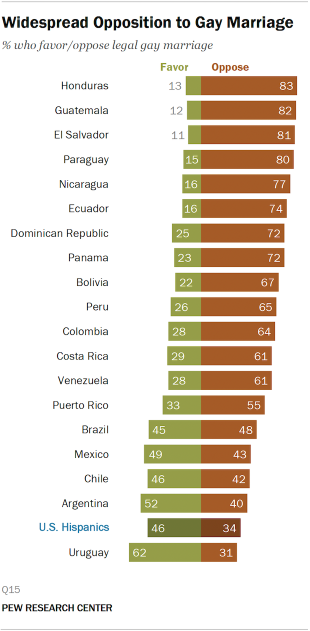
Latin Americans tend to express traditional views about sexuality, marriage and social mores. For example, majorities in most Latin American countries are opposed to allowing gay and lesbian couples to marry legally. And solid majorities in almost all countries surveyed say abortion should be illegal in all or most circumstances.
Across the region, Protestants are more likely than Catholics to say that abortion should be illegal in all or most circumstances and that same-sex couples should not be allowed to legally wed. Protestants also are consistently more likely than Catholics to view drinking alcohol, divorce, sex outside of marriage and using artificial means of birth control as immoral. And Protestants are more inclined than Catholics to say that wives should always obey their husbands.
In general, Catholics who are more religiously observant express somewhat more conservative social views than do Catholics who are less observant. For example, Catholics who attend Mass weekly generally express lower levels of support for allowing same-sex marriage than do Catholics who attend Mass less often.
Nevertheless, Protestants tend to be more socially conservative than Catholics even when levels of religious observance are taken into account.9 For example, Protestants who say they attend religious services at least once a week express more conservative social attitudes than Catholics who report going to Mass at least weekly. (For more details, see below.)
Views on Same-Sex Marriage

Across most of Latin America, the preponderance of public opinion is opposed to same-sex marriage. Majorities or pluralities in 13 of the 18 countries surveyed, plus Puerto Rico, say that gay and lesbian couples should not be allowed to marry legally.
However, opinion is more closely divided in Brazil, Chile, Mexico and Argentina, which in 2010 became the first Latin American country to legalize same-sex marriage. And in Uruguay, which legalized same-sex marriage in August 2013, a majority of the public (62%) says same-sex couples should be allowed to wed. Among Hispanics in the United States, there is more support for (46%) than opposition to (34%) same-sex marriage, just as there is among the U.S. general public as a whole (52% favor, 40% oppose).
Across the countries and territories surveyed in Latin America, Protestants oppose same-sex marriage by greater margins than do Catholics. In Puerto Rico, for example, 72% of Protestants reject gay marriage, compared with 45% of Catholics. Similar gaps of 20 percentage points or more are seen in Venezuela, Uruguay, Brazil, Argentina, Colombia, Costa Rica, Chile and Mexico.
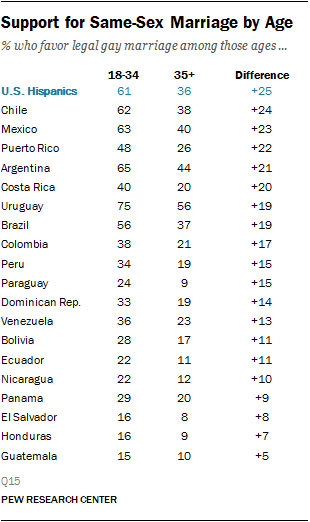
In places where adequate sample sizes are available for analysis, people with no religious affiliation tend to be more supportive of gay marriage. Still, roughly two-thirds or more of the religiously unaffiliated oppose same-sex marriage in Honduras (74%), Nicaragua (69%), the Dominican Republic (65%) and El Salvador (65%). By contrast, the unaffiliated lean strongly in favor of same-sex marriage in Argentina (75% favor, 19% oppose) and Uruguay (77% vs. 17%).
Across Latin America, women and men are about equally likely to oppose same-sex marriage, but young adults (ages 18-34) are generally more supportive of gay marriage than are older adults. In Mexico, for example, 63% of those ages 18-34 say gay and lesbian couples should be allowed to marry, compared with 40% of those ages 35 and older. In the U.S. as well, younger Hispanics are more supportive of gay marriage than are older adults.
Views on Abortion
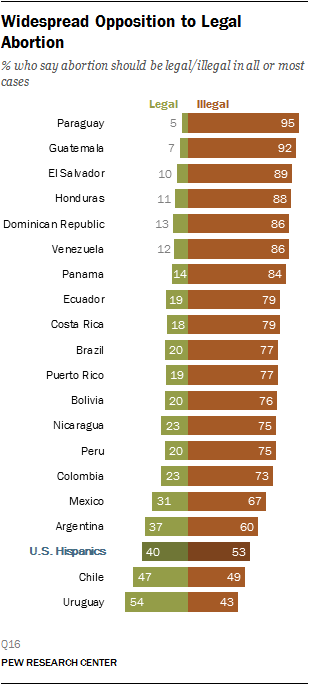
Most Latin Americans believe that abortion should be illegal in all or most cases. Only in Uruguay, which has some of the most liberal abortion laws in Latin America, does at least half the public (54%) voice support for legal abortion in all or most cases. In Chile, public opinion is divided on the issue; 47% say that abortion should be legal in all or most cases, while 49% say it should be illegal in all or most circumstances. Elsewhere, clear majorities – ranging from 60% in Argentina to 95% in Paraguay – oppose making abortion lawful. Even in Puerto Rico, where U.S. law guarantees a woman’s right to an abortion, roughly three-quarters of the public says that the procedure should be outlawed in all (51%) or most cases (26%).
More U.S. Hispanics say abortion should be illegal in all or most instances (53%) than say it should be legal (40%). Among Americans overall, the opposite is true; 54% say abortion should be legal in all or most cases, while 40% say it should be illegal.
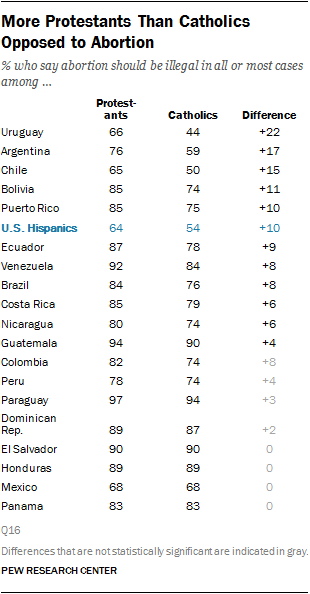
Protestants lean more strongly than Catholics toward the position that abortion should be illegal in all or most cases. In Chile, for example, about two-thirds of Protestants say abortion should be illegal, while half of Catholics take that position. In Argentina, 59% of Catholics say abortion should be illegal, compared with about three-quarters of Protestants (76%).
In most countries, majorities of adults who have no religious affiliation say abortion should be illegal in all or most cases, including roughly eight-in-ten or more unaffiliated people in Honduras (85%), the Dominican Republic (82%) and El Salvador (81%). Opposition to legal abortion is lower among the religiously unaffiliated in Chile (28%), Uruguay (31%) and Argentina (40%).
The survey finds that across Latin America, men and women are about equally likely to oppose legal abortion, as are older and younger adults.
Homosexuality and Abortion as Moral Issues
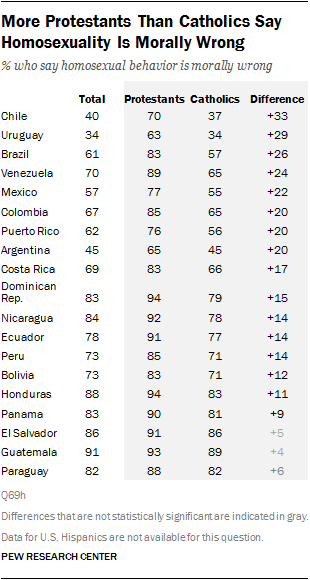
Latin Americans’ attitudes toward same-sex marriage and abortion appear to be shaped in part by moral judgments. In 15 countries plus Puerto Rico, majorities say homosexuality is immoral, ranging from 57% in Mexico to 91% in Guatemala. Only in Argentina, Chile and Uruguay do fewer than half of adults consider homosexual behavior morally wrong.
In most countries surveyed, majorities of both Protestants and Catholics agree that homosexuality is immoral. However, Protestants are particularly inclined toward this view. Indeed, in several countries, the percentages of Protestants who say homosexual behavior is morally wrong exceed the comparable percentages of Catholics by at least 20 points.
Overall, the religiously unaffiliated are less likely than either Protestants or Catholics to say that homosexuality is morally wrong. Even among the unaffiliated, however, majorities in a handful of countries see homosexual behavior as morally objectionable. These countries include Honduras (80%), the Dominican Republic (80%), Nicaragua (74%), El Salvador and Venezuela (71% each).
Across Latin America, people between the ages of 18 and 34 are less likely than their elders to find homosexual behavior morally objectionable. In Argentina, for example, 37% of adults younger than 35 say that homosexual behavior is morally wrong, compared with fully half of those 35 and older (51%). Roughly half of younger Puerto Ricans say that homosexual behavior is morally objectionable (52%), compared with about two-thirds of older Puerto Ricans (66%).
In most countries, men and women share similar views on the moral acceptability of homosexuality. But in a handful of countries, more men than women say that homosexuality is morally wrong.
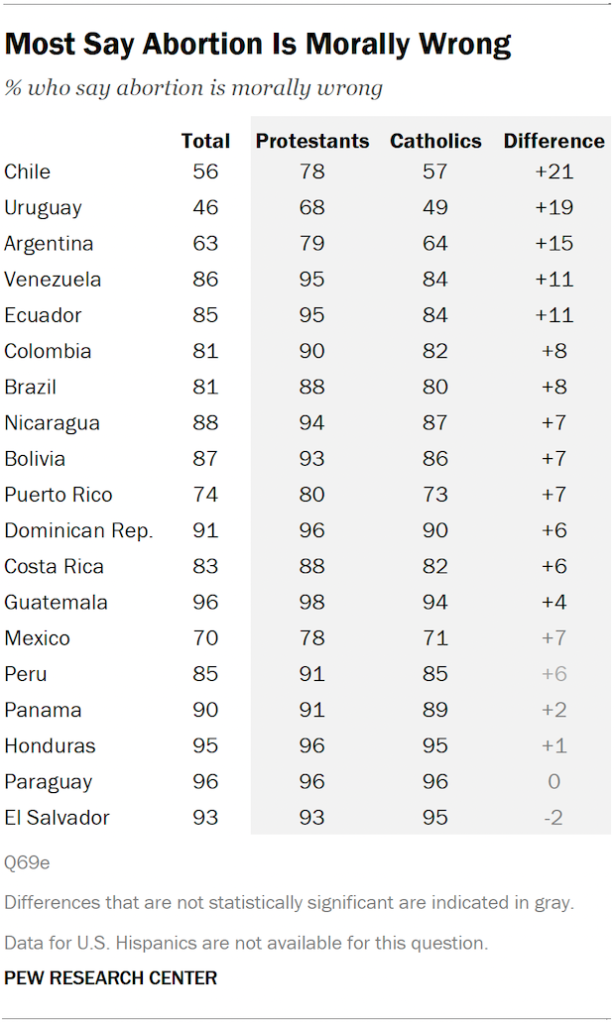
Clear majorities across the region describe abortion as morally wrong. Indeed, Uruguay is the only country surveyed where less than half of the public (46%) says abortion is immoral. Elsewhere, most respondents consider abortion morally wrong, a position verging on unanimity in Paraguay (96%), Guatemala (96%) and Honduras (95%).
Protestants are more likely than Catholics to describe abortion as morally unacceptable. In Uruguay, for example, about two-thirds of Protestants say that abortion is morally wrong (68%), compared with roughly half (49%) of Catholics.
In most countries, many people who do not identify with any religion also subscribe to the view that abortion is immoral. Only in Argentina, Chile, Mexico and Uruguay do fewer than half of religiously unaffiliated people say abortion is morally wrong.
Across the region, women are about as likely as men to say that abortion is morally unacceptable. And younger Latin Americans are about as likely as older Latin Americans to say that abortion is morally wrong. Where differences do arise, more women than men generally say that abortion is morally wrong. And in a handful of countries, those above the age of 34 are more likely than those between the ages of 18 and 34 to say that abortion is morally unacceptable.
Other Moral Issues
When it comes to the moral acceptability of drinking alcohol, divorce, having sexual relations outside of marriage and using artificial means of birth control, the survey shows that Protestants express considerably more conservative opinions than do Catholics. And on balance, the religiously unaffiliated are more accepting of these behaviors than are either Protestants or Catholics.
Drinking Alcohol
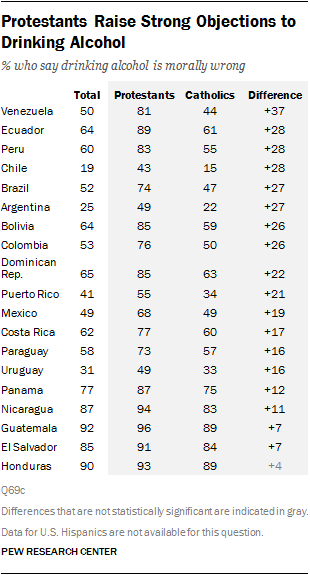
Many Latin Americans see the consumption of alcohol as morally objectionable. In most countries surveyed, half or more of adults say that drinking alcohol is morally wrong, including roughly nine-in-ten in Guatemala (92%) and Honduras (90%). Moral objections to drinking alcohol are least common in Chile (19%) and Argentina (25%).
Protestants tend to object to alcohol consumption more strongly than do Catholics. In most countries, clear majorities of Protestants say that drinking alcohol is morally wrong. Among Catholics, opinion is more divided. In about half of the countries surveyed, majorities of Catholics say that they have moral objections to drinking alcohol. But elsewhere, half of Catholics or fewer say that drinking alcohol is morally wrong.
In Venezuela, Protestants are far more likely to object to alcohol consumption (81%) than are Catholics (44%). Wide differences between the opinions of Catholics and Protestants also are seen in Ecuador, Peru and Chile, all of which have gaps of 28 percentage points between Protestants and Catholics on this question.
Smaller shares of the religiously unaffiliated have moral objections to drinking alcohol. But in a handful of countries, including Honduras (81%), Nicaragua (75%) and El Salvador (70%), majorities of the religiously unaffiliated say that drinking alcohol is morally wrong. (See survey topline for full results.)
Across Latin America, more women than men say that drinking alcohol is morally objectionable. Latin Americans ages 35 and older also are somewhat more likely to object to drinking alcohol than are adults under 35.
Divorce
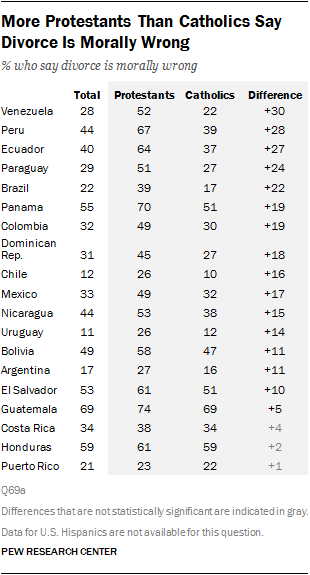
In most Latin American countries, fewer than half of people say that divorce is morally wrong. However, more than half of adults raise a moral objection to divorce in Guatemala (69%), Honduras (59%), Panama (55%) and El Salvador (53%).
Although the Catholic Church teaches that marriage is an “indissoluble union” between a man and a woman, Protestants across Latin America are more solidly opposed to divorce than Catholics are. The gap between the views of Protestants and Catholics is especially wide in Venezuela, where half of Protestants (52%) say divorce is morally wrong, compared with 22% of Catholics. Protestants also are far more likely than Catholics to say that divorce is immoral in Peru (67% vs. 39%) and Ecuador (64% vs. 37%).
Overall, fewer Latin Americans ages 18-34 object to divorce on moral grounds than do older people in the region. Latin American men are about as likely as women to say that divorce is morally wrong.
Sex Outside Marriage
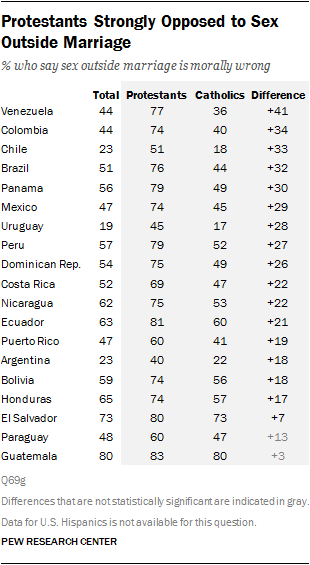
Latin Americans are divided on the morality of sex outside marriage. In eight of the countries surveyed, majorities of adults say that sex between people who are not married to one another is morally wrong. But in other countries, roughly half or fewer object to sex outside marriage. Moral objections to sex outside marriage are highest in Guatemala (80%) and El Salvador (73%) and lowest in Uruguay (19%), Chile (23%) and Argentina (23%).
Generally, Protestants are more likely to oppose sex outside marriage than are Catholics. In 15 countries plus Puerto Rico, majorities of Protestants say that sex between people who are not married to each other is morally wrong. Among Catholics, half or fewer share this view in most countries surveyed.
As on other topics related to morality, differences between Protestants and Catholics are especially pronounced in Venezuela, where 77% of Protestants and 36% of Catholics say that sex outside marriage is morally wrong. Gaps of 30 percentage points or more between Protestants and Catholics also are seen in Colombia, Chile, Brazil and Panama.
In nearly all countries where adequate sample sizes are available for analysis, fewer than half of people who are unaffiliated with any religion say that sex outside marriage is morally wrong. (See survey topline for full results.)
Younger Latin Americans (those ages 18-34) are less likely than older adults to find sex outside marriage morally objectionable. In most countries, men and women are about as likely to object to sex outside marriage. In a few countries, however, men are less likely to say that sex between people who are not married is morally wrong. In Colombia, for example, 38% of men say that sex outside marriage is morally wrong, compared with 49% of women.
Artificial Means of Birth Control
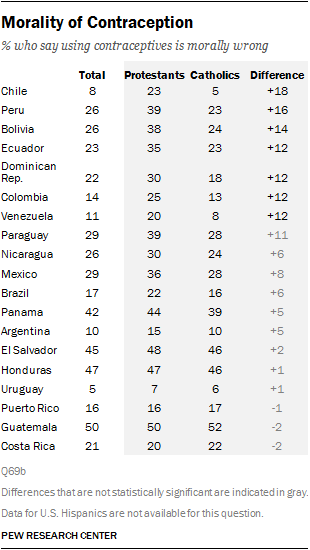
Fewer Latin Americans express moral objections to the use of contraceptives than object to abortion and same-sex marriage. In most countries, fewer than a third of adults – including just 10% of Argentinians, 8% of Chileans and 5% of Uruguayans – say that using contraceptives is morally wrong. Objections to artificial means of birth control are highest in Guatemala, Honduras, El Salvador and Panama, where roughly four-in-ten or more adults view contraception as morally wrong.
In many countries surveyed, significantly higher shares of Protestants than Catholics say that using contraceptives is morally wrong. In Chile, for example, roughly a quarter of Protestants (23%) say using contraceptives is morally wrong, compared with just 5% of Catholics. And in Peru, about four-in-ten Protestants (39%) object to artificial means of birth control, compared with 23% of Catholics.
Latin Americans who do not identify with any religion are less likely to object to contraceptive use than are either Catholics or Protestants. Very few religiously unaffiliated people in Argentina (3%), Uruguay (3%) and Chile (4%) say that contraceptive use is immoral. (See survey topline for full results.)
Young Latin American adults (ages 18-34) are less likely than older adults to object to using contraceptives. In El Salvador, for example, roughly half of people ages 35 and older (52%) say that using contraceptives is morally wrong, compared with 36% of adults under 35. Across the region, women are about as likely as men to say that using artificial means of birth control is morally wrong.
Gender Roles in the Family
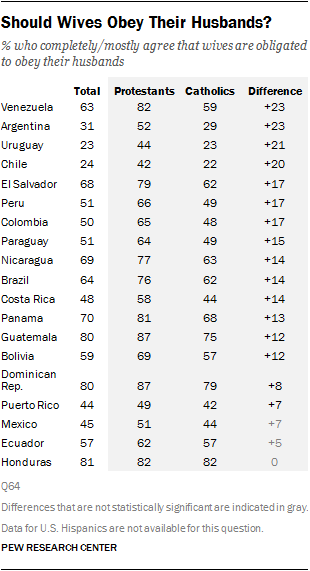
The socially conservative attitudes espoused by Latin Americans extend to traditional notions about gender roles in the family. Indeed, majorities in roughly half of the countries surveyed either completely or mostly agree with the statement that “a wife must always obey her husband.” Only in Argentina (31%), Chile (24%) and Uruguay (23%) do fewer than four-in-ten adults share this view.
Protestants are especially likely to say that wives must obey their husbands; four-in-ten or more in every country surveyed completely or mostly agree with this statement. This opinion is especially widespread among Protestants in Guatemala (87%) and the Dominican Republic (87%).
Many Catholics, too, adhere to the idea that wives should subordinate themselves to their husbands. But in most countries, Catholics are less likely than Protestants to express this view. In Venezuela, Argentina, Uruguay and Chile, for example, the shares of Protestants who say that a wife must always obey her husband are at least 20 percentage points higher than the comparable figures among Catholics.
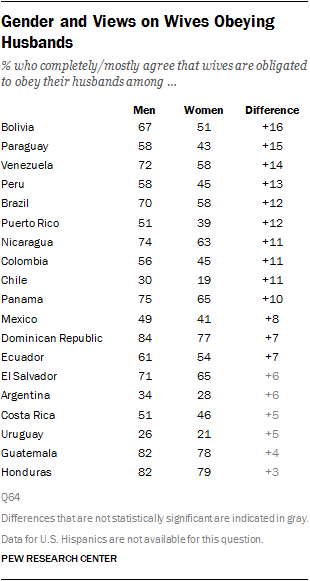
In most countries where adequate sample sizes are available for analysis, fewer than half of religiously unaffiliated people completely or mostly agree that a wife is obligated to obey her husband. Only in four countries – the Dominican Republic (76%), Honduras (65%), Venezuela (62%) and El Salvador (58%) – do majorities of the unaffiliated take this position. (See survey topline for full results.)
Younger adults (ages 18-34) are less likely than their elders to say that a wife is obligated to obey her husband. And overall, more Latin American men than women say that wives are obligated to obey their husbands.
Women across Latin America are divided on this question. In about half of the countries surveyed, majorities or pluralities of women completely or mostly agree that wives are obligated to obey their husbands. These countries include Honduras, Guatemala and the Dominican Republic, where more than eight-in-ten women say that wives are obligated to obey their husbands. In other places – such as Chile, Uruguay, Argentina, Puerto Rico and Mexico – women either mostly disagree with this view or express divided opinions.
Catholics and Protestants: Religious Commitment and Moral Views
Protestants who attend church at least weekly express more conservative views on social issues than do Catholics who attend Mass weekly.
